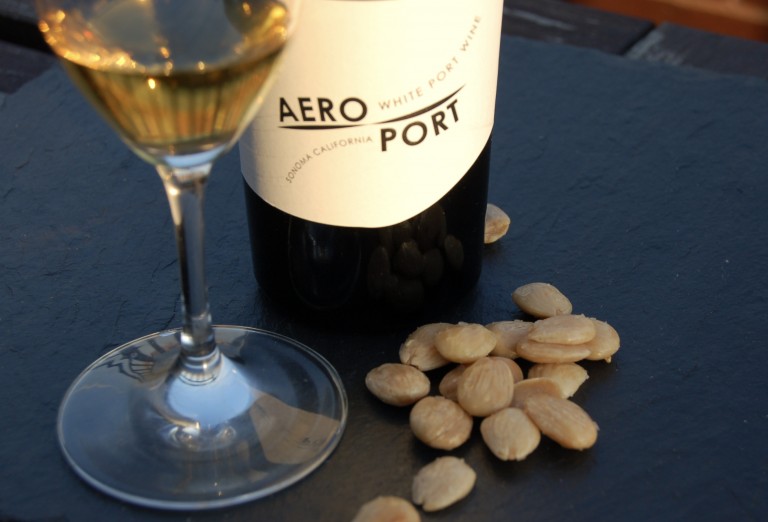Cozy Up To the Fire With an American Port-Style Wine
All photos by Amy Miller. American fortified wines are about as idiosyncratic as they come in the wine world. Although they've been made here since the late 1700s, no singular style has emerged out of any of the major wine regions. Lacking any guidance from tradition, however, has meant that winemakers have had a free hand to experiment, especially those emulating port. Some producers use traditional Portuguese grape varieties, but you'll also find port-style wines made from Syrah, Tannat, Zinfandel, even Viognier.
Whatever you do, however, don't call them "port." Since 2006 only those wines made in the Douro Valley in Portugal can use the protected geographical name (those made before 2006 can still use the term). American winemakers, therefore, have had to get creative with their marketing, coming up with names like "Starboard" and "USB" (get it? ports?). All ports are made by adding brandy to halt fermentation leaving behind some of the grapes' natural sugars. The different styles come from differences in aging and blending. Most American ports are ruby styles, which means they are bottled after a few years aging in barrel and still show ripe red fruit. Tawnies are aged in barrel much longer and take on dried fruit and toffee notes. Whether you pair them with cheese, dessert or simply sip by the fire, American port-style wines are worth seeking out. Here are a few to try:
Anaba White Aero Port, 375 ml, $24
Anaba Red Aero Port, 375 ml, $28
Anaba gets its name from the cool Anabatic winds that blow in from the Pacific Ocean through the valley in Sonoma, California. They moderate the hot summer temperatures and allow grapes to ripen slowly. Winemaker John Sweazey makes a range of dry wines from Burgundian and Rhone varieties, but his two ports are made from exclusively from those of the Northern Rhone: Viognier and Syrah. Both are fortified using brandy made from the same varieties, accentuating each grape's characteristics. Viognier's heady aromatics lend the white port wonderful scents of apple juice and candied orange that follow through to the palate. It's a silky, full-bodied wine that is sweet enough to drink on its own for dessert, or sip as an aperitif alongside Marcona almonds. Anaba's red port is made using 100% Syrah, which is cold fermented and aged in oak for 3-4 years. This is a full-bodied ruby style, with razor-like acidity and flavors of currants, dried cherries, raisins and chocolate.
Quady Starboard Batch 88, 750ml, $30
John and Laurel Quady, have been making dessert and fortified wines at their San Joaquin Valley winery since 1975. Besides Muscat, Vermouth, and Fino Sherry they have also become known for their ports. Starboard Batch 88 is made using the same grape varieties as in Portugual, primarily Tinta Roriz. It falls somewhere between a ruby and tawny style with a mix of ripe and dried fruit notes with a layer of dark chocolate. It's smooth and rich and would pair well with blue cheese or chocolate.
Charbay Still House Port, 375 ml, $50
Charbay Distiller's Port, 375 ml, $75
Charbay in Napa Valley is both a winery and distillery run by Karakasevic family: Miles and Susan, their son Marko and his wife Jenni. They make a range of dry wines and spirits, including brandies using an Alambic pot still. Some of the brandies are then used to fortify their ports. Their Still House Port, from 2006, is a blend of Cabernet Sauvignon, Syrah and Zinfandel, fortified with four-year-old Syrah brandy and aged in oak barrels for seven years. This is a medium sweet wine, lighter bodied that you might expect, but with lovely layers of dried cranberries, chocolate and anise and cloves. Charbay’s Distiller’s Port, also from 2006, is made with Cabernet Franc and fortified with six-year-old Cabernet Franc brandy. It was then barrel-aged for six years in French oak. This is a much richer, complex wine full of cranberries and dried cherries and chocolate.
Gypsy Canyon Angelica, 375 ml, $150
Deborah Hall of Gypsy Canyon Winery near Santa Barbara is one of the few winemakers to make Angelica, a port-like, fortified wine made from Mission grapes. This was one of the very first wines ever made in America by the Spanish Missionaries in California in the late 1700s, but as Mission grapes fell out of favor, Angelica largely disappeared. When Hall discovered a plot of century-old Mission vines on her property, she decided to resurrect this historic wine. The base wine is fortified with neutral grape spirit and then spends four years in oak barrels. In the glass it casts a rosy/amber hue and tastes of raspberries, cherry jam and dried figs, honey sprinkled with a hint cinnamon.



